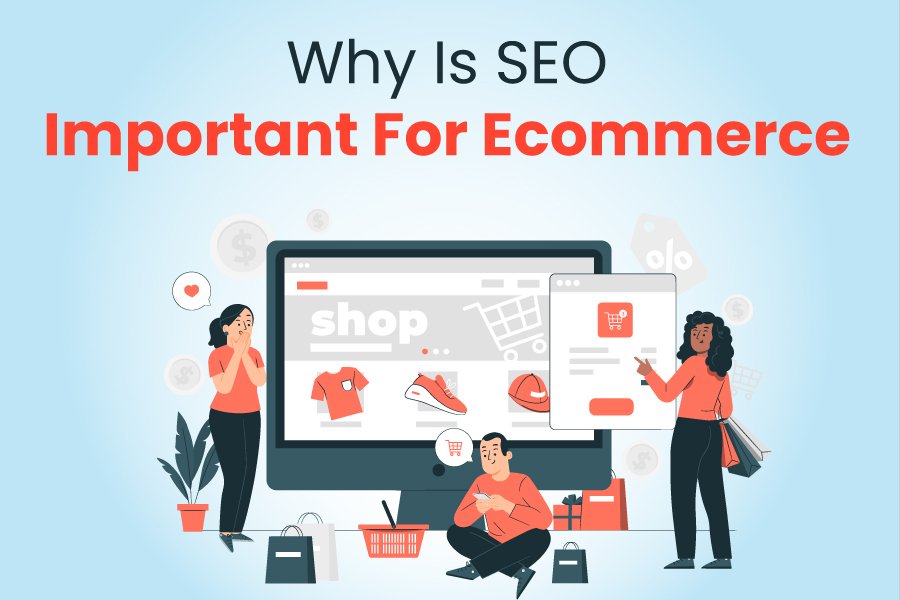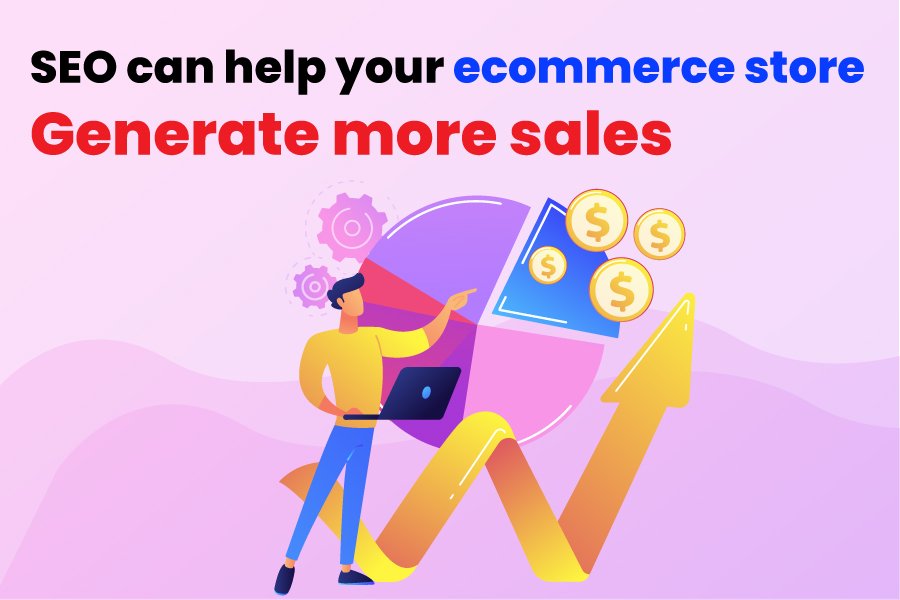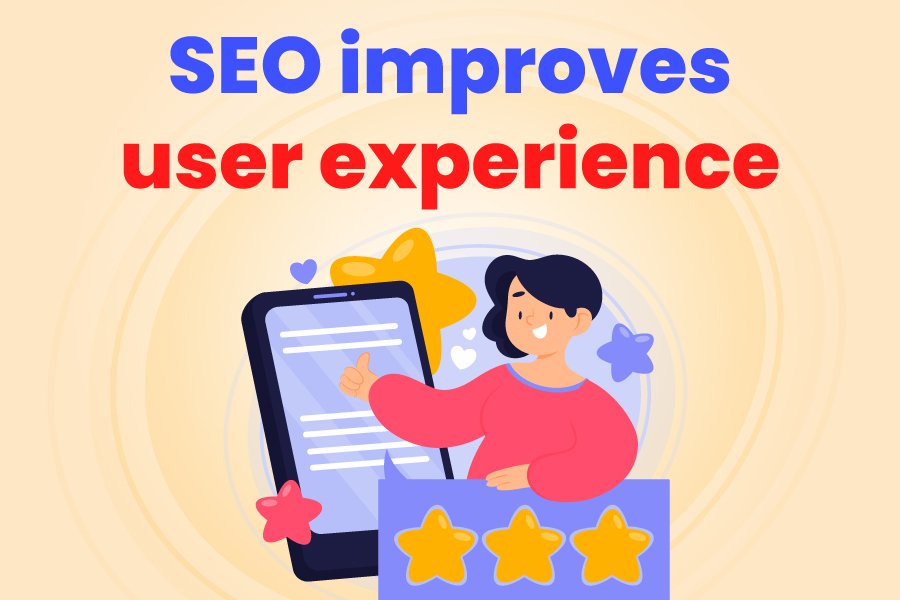
Why is SEO important for e-commerce? Do e-commerce businesses need SEO to succeed online?
We all know e-commerce businesses thrive on traffic. However, e-commerce businesses face massive competition, as thousands of businesses are established daily.
Search engine optimization involves using various online marketing strategies to improve a website’s ranking on the search engine results pages. It improves organic traffic, brand awareness, online reputation, and sales.
In 2024, retail ecommerce sales are expected to reach $6.3 trillion, a figure that will increase from year to year. Here, we’ll discuss the importance of SEO for ecommerce and other things you need to know. Keep reading to find out more!
What Is E-commerce SEO?

Search engine optimization (SEO) involves using various strategies to improve a website’s ranking, organic traffic, online reputation, user experience, and sales. Ecommerce SEO means the same thing. It involves strategies used to improve traffic and ranking of ecommerce business websites.
The major focus of every ecommerce business is to generate more revenue via sales. But that can only be possible by driving more traffic to your online store.
Who Needs Ecommerce SEO?

Search engine optimization (SEO) is an online marketing strategy. It is one of the digital marketing strategies you can deploy to achieve your marketing goal.
There are other marketing strategies besides SEO. These include:
- Pay-per-click (PPC) advertising
- Social media marketing
- Affiliate marketing
- Email marketing
The major aim of every online marketing strategy is to increase ranking, traffic, online reputation and boost sales. Every ecommerce business owner wants to see their revenue increase massively. They want to record more sales and gain massive popularity online.
You can yield results by deploying any of the online marketing strategies mentioned above. However, the goal is to derive a high and impressive ROI.
Which of the online marketing strategies can give your ecommerce business a high ROI? The answer is SEO. SEO has a low customer acquisition cost (CAC) and can help you achieve all your online marketing goals.
In my previous posts, I explained what customer acquisition cost means. But let me summarize it here.
CAC, or customer acquisition cost, refers to the amount it takes to acquire a new customer. And as I said earlier, SEO has a lower CAC than other online marketing strategies.
Is SEO An Effective Online Marketing Strategy For Ecommerce Business?

Yes, SEO is an important online marketing strategy for ecommerce. So, if you haven’t been investing in SEO, you aren’t preparing your ecommerce business for the present and future opportunities in the retail ecommerce industry.
Currently, the retail industry is worth $6.3 trillion. That’s how massive ecommerce is. And this figure is expected to increase in the coming years.
Increasing your ecommerce store’s ranking to ensure you appear in potential customers’ SERP (search engine result page) is the aim of SEO. So, an effective SEO strategy can help you rank high in search engine results pages and increase organic traffic to your ecommerce store.
SEO is an effective marketing strategy for ecommerce businesses. That is the main point. It can place your e-commerce store before potential customers actively looking and interested in your products.
Without further ado, let’s discuss why SEO is important for your e-commerce business and how you can use it to achieve marketing success online.
Why Is SEO Crucial For E-commerce?

Why is it advisable for an ecommerce store to invest time, energy, and resources in SEO? Here are the simple reasons.
1: SEO drives high-quality organic traffic:

Studies have shown that organic search and referral traffic are the most effective sources of marketing ROI for businesses. Research has also confirmed that people trust organic search results more than paid search.
Search engine optimization helps to drive traffic to your ecommerce website. It will bring potential customers looking for and interested in your products to your ecommerce store.
It’s important to adhere to SEO best practices. This way, you can drive traffic to your online store and ensure you don’t violate the rules of search engines while implementing your online marketing strategies.
The first and most important step in SEO is comprehensive keyword research. You’ll find short-tail and long-tail keywords.
Assuming you’re selling hiking boots online. The short-tail keyword example for your product will be, “hiking boots,” while the long-tail example is “best hiking boots for men.” So, long-tail keywords boost more words than short-tail.
Studies show that keywords 10-15 words long get 1.76x more clicks than those that contain fewer words.
Furthermore, optimize your content, meta description, and title tag with your target keyword to improve search ranking, and traffic. Add your keyword in your URL, too.
According to a study, posts with the target keyword in the URL get 45% higher click-through-rates than posts that don’t.
Whenever potential customers search online for the products you’re selling using your target keyword, your ecommerce store should appear in their search results. That’s when you know your ecommerce store is well-optimized with your target keyword.
Identifying the right keyword is important in SEO. When you properly target the right keyword and optimize your ecommerce store, potential customers will easily find you.
A Handy Tip: Avoid keyword stuffing or cannibalization when executing your on-page SEO strategies. Google doesn’t fancy it.
Keyword stuffing or cannibalization can hurt ecommerce websites ranking or traffic. Google won’t hesitate to penalize ecommerce websites that violate its rulest.
2: SEO will bring sustainable traffic to your ecommerce store:
You can drive massive amounts of traffic via several digital marketing strategies. These include social media advertisement, pay-per-click (PPC) advertising, and others.
Fortunately, only SEO can drive sustainable organic traffic to your ecommerce store. When I say sustainable, I mean organic traffic that keeps coming non-stop. Even when you stop investing in your SEO for a while, the organic search traffic will keep coming. That is what sustainable traffic means.
Traffic generated via pay-per-click advertising isn’t sustainable. Most businesses don’t have the financial capacity to run paid adverts year-to-year consistently.
You’ll keep paying to place your website in the search engine result page to generate traffic in pay-per-click advertising. And whenever the money in your Google ads account finishes, your ecommerce store will disappear from the search engine result page. That’s how PPC works.
SEO doesn’t work like that. It would require an initial investment (Hiring an SEO agency to manage your campaign), but it’s far cheaper in the long-term.
Once your website ranking in the search engine results improves via SEO, you’ll keep getting traffic. Even if the SEO agency managing your campaign stops working for a while, you’ll keep getting traffic.
SEO generates quality traffic. In other words, most organic visitors that will land at your online e-commerce store are people seeking your products. They are people looking for your product and willing to splash the cash.
Create a sustainable level of organic traffic by investing in SEO. Most of the investments made in SEO usually happen at the beginning of the campaign and produce long-lasting results. But you have to keep your ecommerce store running and your content fresh to continue getting organic traffic.
A Handy Tip: SEO isn’t a one-off strategy; you shouldn’t treat it as such. Hire an SEO agency willing to manage your SEO campaign long-term.
The SEO agency you’re hiring should have the expertise, patience, time, and equipment to monitor your website 24/7 and respond immediately whenever anything goes wrong.
You can manage your SEO campaign by yourself if you have the time. You can even hire an in-house SEO expert. But know that hiring an in-house SEO expert can be expensive. Managing and performing DIY SEO means neglecting other aspects of your business that need your attention.
Search engine optimization is a complex and time-consuming process. It’s also a tricky online marketing strategy. I discussed the dangers of keyword stuffing and cannibalization. These two SEO mistakes alone can negatively affect your website’s ranking potential.
3: Increase brand popularity:

In addition to improving your ecommerce store’s ranking, SEO will make your brand popular online. Your brand will become part of the discussion whenever people mention a similar product you sell.
Your brand will be in the minds of prospects. And even when they are discussing your competitors, your brand’s name will likely pop up.
Even when potential customers visit your competitors’ ecommerce stores, they’ll have you as an alternative. And if your competitors’ products fall below their expectations, they’ll come running straight to you.
4: SEO creates brand awareness:

As humans, we easily remember something we encounter often. People can have an image of your brand in their heads when they encounter it often online. When this happens, your brand will be the first thing on their minds whenever they need similar products.
You can also use SEO to create awareness about new and existing products. Use the various on-page and off-page SEO strategies to improve your website’s ranking and traffic to create brand awareness.
Search engine optimization is a great strategy to create more awareness about your brand. It will place your brand where potential customers can easily find you online.
5: SEO can help your ecommerce store generate more sales:

Research shows that 81% of people conduct research on a company before purchasing a product. Another important study indicates that 47% of people consume at least 3-5 content before contacting a salesperson.
These studies show why SEO is important for ecommerce. Without SEO, PPC is your only chance to appear in prospects’ search engine result pages. Unfortunately, PPC is expensive. And the more competitive a keyword becomes, the more expensive it will be to run ads.
SEO will place your ecommerce store where potential customers can find you and check out the products (including content) you’re offering.
A Handy Tip: Thousands of ecommerce stores compete for customers online daily. Hundreds of thousands of online stores also sell the same products you’re selling.
The bottom line is to ensure your ecommerce store is among the online stores in the search engine results of prospects. In other words, whenever a potential customer searches online with your target keyword, your ecommerce store should appear in their search engine results pages.
When your ecommerce website appears in the search engine results pages of prospects, they may likely patronize you. Prospects will find and patronize your competitors when you don’t appear in their search results. And this will most likely happens when you abandon SEO.
6: SEO improves user experience:

Did you know UX (user experience) is a de facto ranking factor? It’s one of the factors search engines consider when ranking websites.
Google is a private business and the biggest search engine in the world. Google has worked hard and sacrificed a lot to get to where it is today and wants to keep maintaining its status.
What’s the point here? Understand that Google places huge emphasis on a website’s UX. It places a higher value on websites that deliver a good user experience. These include a mobile-friendly, responsive website with fast loading speed and readable content.
Google also considers the bounce rate and dwell time when evaluating a website’s UX. It will consider the quality of your content and its relevance to users’ search queries.
Now, let’s discuss how mobile friendliness and website load speed are important in SEO.
Mobile-friendliness:
Mobile-friendliness implies that a website works the same way or provides a seamless user experience when accessed on a mobile device. In other words, when a user accesses the website on their mobile devices, it will display its content the same way it does on a desktop computer.
When users access the content of a mobile-friendly website, they don’t have to zoom in or strain their eyes to view the texts. That’s what mobile-friendliness is.
There are currently more mobile phones than people in the world. There are 8.58 billion mobile phones worldwide, while the world population is just 7.95 billion.
In 2016, Google reported that around 50% of traffic was from mobile phones. In 2024, 60.67% of traffic came from mobile phones alone. Research has also revealed that 92.3% of internet users prefer to access the internet via their mobile devices.
SEO involves a combination of strategies aimed at improving ranking and organic traffic. Mobile-friendliness is a major ranking factor. That means you must make your site mobile-friendly to improve your chance of ranking for the target keyword.
Website load speed:
Whenever visitors find your website, they expect to gain access to your content with ease when they click on the link. They expect your website to load faster and give them access to your content.
Website load speed refers to how fast a browser loads a fully functional webpage. A website that loads faster will have more traffic and a better conversion rate. The UX of such websites will be good, too.
People have short attention spans. And the fierce competition in the business environment makes matters worse. Your visitors are ready to move straight into the arms of your competitors if your website takes longer to load. They are ready to visit your competitors and patronize them.
Google appreciates websites that load faster. Page load speed is also a major ranking factor. It affects a website’s search ranking, reputation, credibility and click-through rate.
What is a good page load speed? First and foremost, understand that Google wants your site to load immediately a visitor clicks on your link. It wants websites to load in under half a second.
A page load speed of 0-2 seconds is great. 3 seconds load speed is considered acceptable. Anything above 3 seconds can reduce your traffic and conversion rate. In other words, it can increase the possibility of visitors leaving your site.
A Handy Tip: Your website’s mobile-friendliness and load speed are technical SEO issues that can be fixed. You can fix them yourself or hire an expert in SEO to address the issue for you.
By implementing your SEO strategy, you’re improving user experience. For instance, by increasing your website load speed and making it mobile-friendly, you’re increasing its chance of ranking high in SERPs.
In addition to improving ranking and traffic, making your website mobile-friendly and load faster improves user experience. Your visitors will have a great time navigating from one page to another when they visit your website.
Therefore, SEO doesn’t just improve your ranking and traffic. It improves user experience, a de facto ranking factor. Visitors may also want to repeat patronage when they have a great time on your website.
7: SEO is a cost-effective marketing strategy:

The massive competition in the ecommerce industry encourages more businesses to budget more on marketing. The ecommerce industry is a massive industry worth trillions of dollars. The competition in the industry is also very tough.
Unlike other marketing strategies, SEO is cost-effective. And it’s a marketing strategy that can significantly impact your business. It will help you rank high on the search engine result page, gain massive popularity online and drive sales.
When you compare the cost of running a paid advert to SEO, you’ll understand why most of your competitors have already embraced SEO. The initial cost of hiring an SEO expert may seem high. But in the long run, you’ll discover it’s cheaper than other online marketing strategies.
A Handy Tip:
If you’re outsourcing your SEO project, outsource to a competent SEO agency. Understand that paying an SEO agency a massive monthly fee doesn’t mean you’ll achieve your SEO goals.
You can achieve your SEO goals by outsourcing to an affordable and competent SEO agency. Just find an SEO company willing to go the extra mile to get results without you breaking the bank.
8: SEO helps you build trust:

One major downside online businesses face is trust. Before customers can confidently purchase a product, they must trust the brand they are dealing with.
Trust is easy to build for brick-and-mortar stores. Customers already know the store’s exact location, can access the products physically, and can test the product before making a purchase.
Ecommerce businesses can build trust. How? That’s were SEO comes in. With SEO, you can rank your business high in SERPs, making it easier for prospects to find you.
Furthermore, people trust the Google search engine. They know Google will only display the best results at the top of the SERP. So, if your website appears at the top of Google search results, prospects will consider you a reputable brand.
Google considers several factors when ranking websites. It doesn’t rank websites because they have more features or look professional. Instead, it considers user experience, dwell time, bounce rate, quality of your content, mobile-friendliness, load speed, quality of backlinks, and other factors (200+ ranking factors) to determine where to rank websites in the SERP.
Now, let me ask you this simple question. If you’re looking to hire a lawyer, will you consider choosing a lawyer at the bottom of the search result? Of course, you’ll want to choose from the first ten law firm websites that appear in the search result.
Your reason might not be because you can’t keep scrolling to the last page. It would be because you trust the first few results in the SERP. You are confident that the lawyers on those first few results can render the quality of legal service you seek.
Outsourcing Your Ecommerce SEO To A Reputable Agency

SEO can help your ecommerce store to achieve your online marketing goals. It can help your website rank high on SERPs, generate more traffic, build a solid online reputation, create brand awareness, and generate more sales.
You can enjoy the benefits of SEO by outsourcing your online marketing campaign to a reputable and committed agency. Hire an agency ready to go the extra mile to get the desired results.
BitChip Digital is an experienced digital marketing company established to help businesses run successful SEO campaigns, and grow their ecommerce businesses.
Conclusion
So, what makes SEO important for ecommerce? We have discussed eight reasons why ecommerce businesses must invest in SEO.
SEO is a cost-effective marketing strategy. It will improve organic traffic to your ecommerce business and cause you to generate more sales. Search engine optimization doesn’t just generate organic traffic. It generates high-quality traffic, which comprises people already seeking your products and ready to splash the cash.
